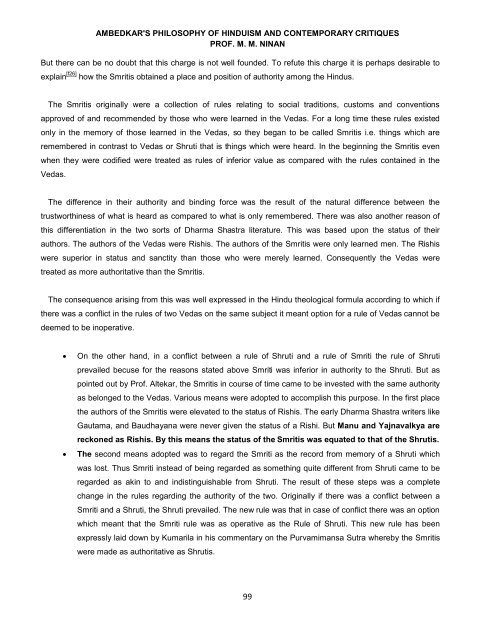Ambedkar-Philosophy of Hinduism
Create successful ePaper yourself
Turn your PDF publications into a flip-book with our unique Google optimized e-Paper software.
AMBEDKAR'S PHILOSOPHY OF HINDUISM AND CONTEMPORARY CRITIQUES<br />
PROF. M. M. NINAN<br />
But there can be no doubt that this charge is not well founded. To refute this charge it is perhaps desirable to<br />
explain [f26] how the Smritis obtained a place and position <strong>of</strong> authority among the Hindus.<br />
The Smritis originally were a collection <strong>of</strong> rules relating to social traditions, customs and conventions<br />
approved <strong>of</strong> and recommended by those who were learned in the Vedas. For a long time these rules existed<br />
only in the memory <strong>of</strong> those learned in the Vedas, so they began to be called Smritis i.e. things which are<br />
remembered in contrast to Vedas or Shruti that is things which were heard. In the beginning the Smritis even<br />
when they were codified were treated as rules <strong>of</strong> inferior value as compared with the rules contained in the<br />
Vedas.<br />
The difference in their authority and binding force was the result <strong>of</strong> the natural difference between the<br />
trustworthiness <strong>of</strong> what is heard as compared to what is only remembered. There was also another reason <strong>of</strong><br />
this differentiation in the two sorts <strong>of</strong> Dharma Shastra literature. This was based upon the status <strong>of</strong> their<br />
authors. The authors <strong>of</strong> the Vedas were Rishis. The authors <strong>of</strong> the Smritis were only learned men. The Rishis<br />
were superior in status and sanctity than those who were merely learned. Consequently the Vedas were<br />
treated as more authoritative than the Smritis.<br />
The consequence arising from this was well expressed in the Hindu theological formula according to which if<br />
there was a conflict in the rules <strong>of</strong> two Vedas on the same subject it meant option for a rule <strong>of</strong> Vedas cannot be<br />
deemed to be inoperative.<br />
• On the other hand, in a conflict between a rule <strong>of</strong> Shruti and a rule <strong>of</strong> Smriti the rule <strong>of</strong> Shruti<br />
prevailed becuse for the reasons stated above Smriti was inferior in authority to the Shruti. But as<br />
pointed out by Pr<strong>of</strong>. Altekar, the Smritis in course <strong>of</strong> time came to be invested with the same authority<br />
as belonged to the Vedas. Various means were adopted to accomplish this purpose. In the first place<br />
the authors <strong>of</strong> the Smritis were elevated to the status <strong>of</strong> Rishis. The early Dharma Shastra writers like<br />
Gautama, and Baudhayana were never given the status <strong>of</strong> a Rishi. But Manu and Yajnavalkya are<br />
reckoned as Rishis. By this means the status <strong>of</strong> the Smritis was equated to that <strong>of</strong> the Shrutis.<br />
• The second means adopted was to regard the Smriti as the record from memory <strong>of</strong> a Shruti which<br />
was lost. Thus Smriti instead <strong>of</strong> being regarded as something quite different from Shruti came to be<br />
regarded as akin to and indistinguishable from Shruti. The result <strong>of</strong> these steps was a complete<br />
change in the rules regarding the authority <strong>of</strong> the two. Originally if there was a conflict between a<br />
Smriti and a Shruti, the Shruti prevailed. The new rule was that in case <strong>of</strong> conflict there was an option<br />
which meant that the Smriti rule was as operative as the Rule <strong>of</strong> Shruti. This new rule has been<br />
expressly laid down by Kumarila in his commentary on the Purvamimansa Sutra whereby the Smritis<br />
were made as authoritative as Shrutis.<br />
99


















